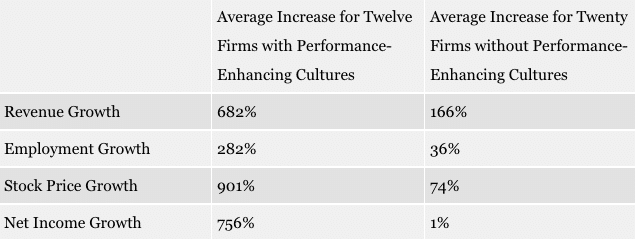
As social media and search engines become more intelligent and prevalent, companies are battling the image that others outside the organization see as well as what employees feel. Entrepreneur Magazine even said that, “Company culture is more important than ever. It’s not that company culture was ever unimportant, but it’s quickly proving to be a “must-have” rather than a “nice-to-have.”” Have you ever worked in a company that had a bad culture? I have. I counted down the minutes until I could leave the office. Work for me was not enjoyable. As the financial leader of the company, I was not focused on driving financial results. Simply put, culture drives financial results.
[box] Culture starts with your team. Before you add anyone else into your organization, click here to access your free 5 Guiding Principles for Recruiting a Star-Quality Team. [/box]
How Company Culture Drives Financial Results
Before we get into how company culture drives financial results, what is culture? Investopedia defines culture as “the beliefs and behaviors that determine how a company’s employees and management interact and handle outside business transactions.” In other words, you cannot say and it be with culture. Culture is organically developed over months or years. It depends on how is in the organization and how the organization acts as a whole through trials and successes.
Culture is also often created by the corporate governance and leadership of the organization. The tone starts at the top. Cultural changes happen also, especially when there is a change in ownership. A change in ownership can bring a change in governance, personalities, processes, and even language. Depending on the complexity of business, it may take from one year to three years to really complete an integration of an acquisition. The leadership of the organization must know what is going on in the culture of the organization as this has a direct effect on the bottom line.
Increased Performance
If employees are happy in an organization, then they will have increased performance. Some of the causes of increased performance stems from increased flexibility, professional development, and knowing that they are making their mark on the world.
Millennials are the largest generational cohort in the workforce in today’s world. As a result, they are spreading their desires in the workplace to other generations. For example, they value flexibility – the ability to work remotely, to have a standing desk, to work in a co-working space, to have odd-hours instead of the 9-5.
Additionally, they want to be further trained and develop. I once had an employee who told me that they didn’t care about the money if they were able to get professional development. At first, I was hesitant to provide that extra training because they were just going to leave me for more money after I had invested. But that employee didn’t leave. In fact, that employee was the most loyal in my organization.
Millennials are a funny generation! They definitely think outside the box and often bring ideas that the “traditional” worker would have not thought about. A good leader needs to know what drives his employees. What I have learned is that they want to know they are making a difference in people’s lives. They want to know that they are doing more good than harm. This could be supporting the homeless community or sponsoring an orphan. Or it could be storytelling how the organization’s efforts changed a customer’s life. It’s a simply thought, but when you expand work outside of the four walls of your office, those employees have more purpose and passion about their work. Thus, increasing their performance.

Increased Productivity
Additionally, you can also expect increased productivity from good company cultures. Think about Google and their office environment. With ping pong tables, napping pods, and playful environments, employees are told that they can have fun. Many times, entrepreneurs and executives think that working hard 8-12 hours a day will result in incredible results. But the employees feel like they can’t relax. There’s increased stress, decreased productivity, and eventually high turnover.
Increased Retention
Staffing, recruiting, hiring, and talent acquisition is both costly and time consuming. When you factor in the time to review resumes, interview, hire, train, onboard, then pay and provide benefits, that individual is an expensive asset on your financial statements. A good company culture will keep and retain those talented assets.
[box] Looking to add more people to your team? Before you start recruiting, download our free 5 Guiding Principles for Recruiting a Star-Quality Team. [/box]
Examples of Company Culture Driving Financial Results
One of our team members once helped transition a company through a merger. All hands were on deck. There was no room for mistakes. And every client of theirs seemed angry. The product was great. Clients had great success from implementing the products. But it was clear there was something severely wrong! Employees were either fired or they quit. Within several months after the merger was official, the company was in financial distress. What we found that it wasn’t pricing or the product… Instead, it was the company culture! A good culture has gone bad.

Another example comes from a study that focused on the financial results of companies with and without performance-enhancing cultures. Needless to say, there is a strong correlation between company culture and growth. In the book Corporate Culture and Performance, John Kotter argues “that strong corporate cultures that facilitate adaptation to a changing world are associated with strong financial results.” When we talk about company culture driving financial results, it’s impacts more than just profit – but the shareholders, employees, and economy.
It’s Start With Who You Hire
Zappos has been known for its culture and prides itself in attributing its success to its corporate culture. What they have realized is that it starts with who you hire. Instead of looking at a resume for credentials, the recruiters essentially court them in a relationship. Similarly, we frequently say to our clients that if you can’t have lunch with a potential hire, do not hire them. When you take an employee out of an office and into the real world, you see how they really perform. Are they rude to the waiter? Or are they patient and kind? Do they hold the door open for people or let it fall in their faces?
For example, the CFO position should have discretion, responsibility, and confidence. If they show up to the wrong coffee shop for a meeting due to assumptions or carelessness or if they are indecisive in choosing a meal, then you need to assess whether they are capable for the position of CFO.
Personality Over Credentials
We once had a client that emphasized that trust was by far the most important quality for their CFO to have. It didn’t matter if they had X, Y, and Z qualifications. In fact, the CEO would rather hire someone who maybe wasn’t as qualified but he could trust over someone who was both qualified and untrustworthy. Especially when considering those high level positions, chose personality over credentials. Obviously, we are not saying to hire someone that cannot do their job. But if you had to decide between two candidates with similar credentials, chose the one that will fit your culture the best.
Be Slow to Hire & Quick to Fire
Bad employees can be a huge drain on resources and can potentially cause more damage than anticipated. That’s why the best corporate cultures are slow to hire and quick to fire. Those entities are protecting their most valuable intangible assets. In order to determine which candidates are the right fit for your company, download and access your free 5 Guiding Principles For Recruiting a Star-Quality Team whitepaper.

[box]Strategic CFO Lab Member Extra
Access your Strategic Pricing Model Execution Plan in SCFO Lab. The step-by-step plan to set your prices to maximize profits.
Click here to access your Execution Plan. Not a Lab Member?
Click here to learn more about SCFO Labs[/box]









